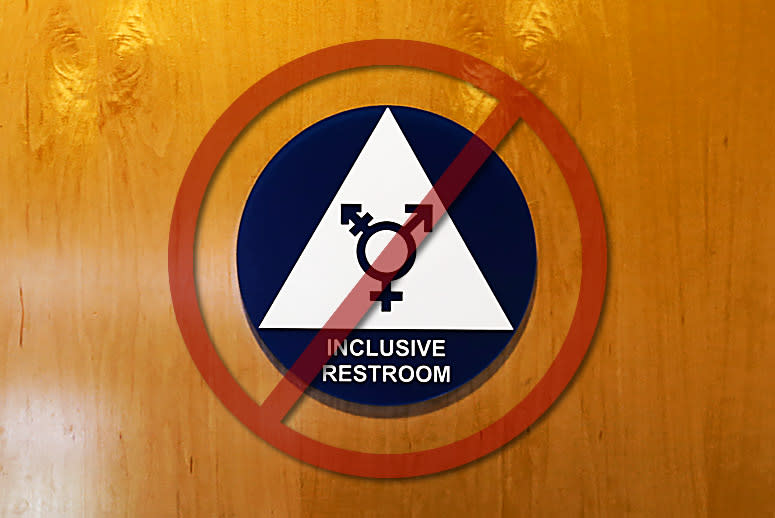This State Is One Step Away From Forcing Trans Students to Use Separate Bathrooms

Federal officials from the Department of Justice to the Department of Education to President Barack Obama have affirmed that transgender students must be allowed to use restrooms that match their gender identity. But that hasn't stopped conservative lawmakers from taking matters into their own hands at the state level.
On Tuesday, the South Dakota Senate voted to approve H.B. 1008, a controversial bill that would regulate bathroom usage based on biological sex, The Associated Press reports. If the legislation is signed into law by Gov. Dennis Daugaard, South Dakota would become the first in the nation with a bill that prohibits transgender students in public schools from using co-ed bathrooms.
The bill states that "every restroom, locker room, and shower room located in a public elementary or secondary school that is designated for student use and is accessible by multiple students at the same time shall be designated for and used only by students of the same biological sex." The bill defines biological sex as determined “by a person's chromosomes and anatomy as identified at birth.” A handful of states, including Virginia and Indiana, have proposed bathroom regulations, but these laws have not made it past the state legislature.
Trans students in South Dakota would still be able to request separate accommodations, such as a private or unisex bathroom, so long as it “does not impose an undue hardship on a school district.”
Supporters of bathroom segregation say that these regulations protect students’ right to privacy, noting that young girls might feel uncomfortable using the same facility as a female transgender student.
“The primary purpose of the bill is to protect the physical privacy of students from having to expose themselves, or be exposed to others, when in a state of undress or nakedness while at school or school functions,” bill sponsor Rep. Fred Deutsch wrote in a blog post earlier in February.
Opponents say privacy concerns for cis-gender students are not based in reality. Media Matters, a nonprofit research group, investigated 17 school districts that have laws protecting transgender students and found no instances of harassment or inappropriate behavior resulting from allowing transgender students to use restrooms that match their gender identity.
“[The bill does] nothing to protect students privacy, but it will do real and lasting harm to vulnerable transgender students,” Heather Smith, executive director of the ACLU South Dakota, said of the bill. The ACLU, the Human Rights Campaign, and the Transgender Law Center have all called on Daugaard to veto the bill.
“This bill would single out transgender students like me by forcing me to choose between using a different bathroom from the rest of my peers and using a bathroom that doesn’t correspond with my gender identity,” Thomas Lewis, a transgender high school student, told the Senate Education Committee last week. “This is only going to further bullying, harassment, and discrimination.” Nearly 85 percent of LGBT teens face bullying from their peers, according to figures from the Gay, Lesbian, and Straight Education Network.
“It opens the door to ridicule and public insult by our peers when really, lawmakers should be focusing on passing legislation where every student can be free to be open about who they are in an accepting environment,” Lewis said.
Along with transgender students’ well-being, restricting bathrooms would open South Dakota schools to costly lawsuits from students and put the state at risk of losing federal funding. Last year, the Department of Justice affirmed that transgender students are protected under Title IX of the Education Amendments of 1972 (which prohibit sex-based discrimination) and that forcing students to use a separate bathroom or one that does not match their gender identity violates their rights.
Daugaard, who said that he has never met a transgender person, will have the final say over whether the bill becomes law. While he initially said he supported the bill, he later said he needed to conduct further research on the issue before making a decision.
Related stories on TakePart:
• From Courtrooms to Bathrooms, Trans People Made Major Progress in 2015
• One State Wants Trans Students to Take Hormones for One Year to Play Sports
• This Tiny Clinic Is Fighting for Trans Patients Illegally Denied Medical Care
Original article from TakePart

